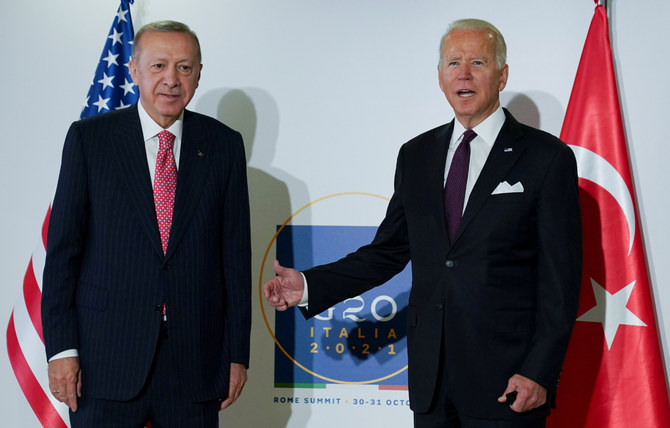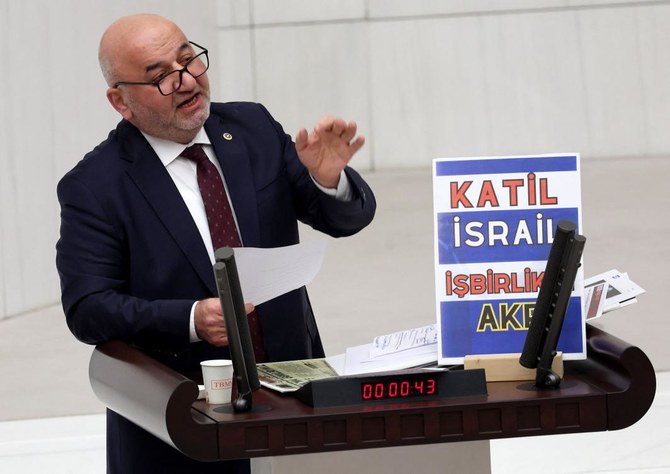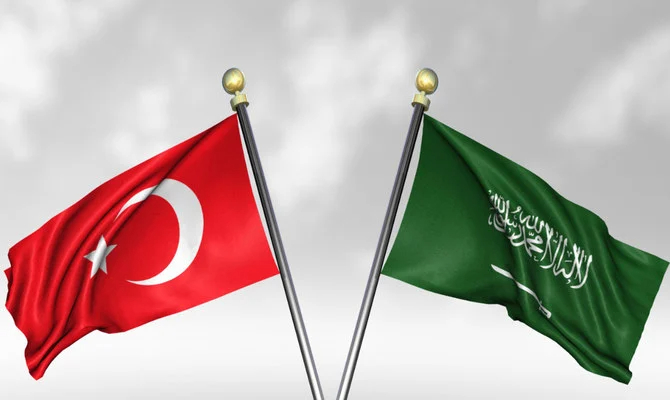ANKARA: The much-awaited meeting between US President Joe Biden and his Turkish counterpart Recep Tayyip Erdogan in Rome on Sunday focused on several topics of longstanding disagreement between the two NATO allies.
During the meeting, Biden noted Turkey’s importance as an ally and its defense partnership with the US, but also raised his concerns about the Russian-made S-400 missile system on Turkish soil that poses a threat to NATO systems, especially amid talk of further purchases of Russian missiles.
Biden also emphasized the importance of strong democratic institutions and respect for human rights, although no details were given of specific human rights issues raised during the meeting, which came days after 10 foreign ambassadors in Turkey, including the US envoy, called for the release of jailed philanthropist Osman Kavala and for the respecting of a ruling by the European Court of Human Rights in a joint statement.
The Turkish presidential office said in a statement that the meeting was held in a positive atmosphere, and both leaders expressed their willingness to “further strengthen and improve Turkey-US relations and agreed to set up a common mechanism accordingly.”
Caroline Rose, senior analyst at the New Lines Institute for Strategy and Policy, told Arab News: “There is limited space for cooperation between Turkey and the US, but it’s unlikely in the near-term that relations will be able to experience a substantial reset or significant rapprochement.”
She added that with Turkey seeking to purchase a second S-400 missile system, rising tensions with Kurdish forces and allied US troops in northeast Syria, and the ripples from the recent diplomatic crisis over Kavala, the Biden administration is hesitant about relying too heavily on its relationship with Ankara.
“Turkey will continue to prove a useful partner against Iran in the Middle East as the US conducts further personnel reduction, as it pivots to Asia. It’s also possible for limited US-Turkey cooperation if tensions continue to de-escalate in the Eastern Mediterranean, opening a potential door to increased ties,” she said.
Soner Cagaptay, director of the Turkish program at the Washington Institute, underlined two reasons that might have pushed the US towards de-escalation with Turkey.
“Every time there is a crisis between Ankara and Washington, the consensus is (on) not ignoring Ankara and keeping it anchored inside NATO. (The) White House follows the same policy once again,” he said.
The Turkish parliament recently ratified a motion to extend troop deployment in Iraq and Syria for another two years, while Turkish Defense Minister Hulusi Akar and US Secretary of Defense Lloyd Austin held a phone call last week to discus regional defense and security issues.
For Cagaptay, another reason for this bilateral meeting is related to Turkey’s imminent operations in northern Syria to undermine territories held by the US-backed Syrian Kurdish People’s Protection Units.
“I think the US administration pushes for the meeting to take place (to) talk about the specifics of such a potential incursion and its mechanisms if this were to happen,” he said.
“But at some zones, the operation would require US troops not to stand in the way of Turkish troops. Both parties would want to see US troops out of harm’s way,” added Cagaptay.
In the meantime, Turkey recently expressed interest in buying 40 Lockheed Martin-made F-16s and another 80 modernization kits for its existing warplanes, but the sale would require the approval of Congress.
By purchasing F-16s, Ankara also wants to recover a $1.4 billion payment made just before it was kicked out of the F-35 Joint Strike Fighter program because of its purchase of the S-400s.
Asked whether he was planning to provide Turkey with F-16s, Biden said they were “planning to have a good conversation.” However, Cagaptay thinks such a deal will face resistance in Congress over the S-400 deal.
Turkish and US defense delegations had a meeting on the F-35s this week in Ankara, with experts thinking the issue could undermine Turkish-US ties.
“There is a strict separation of powers in the US political system, and Congress has a majority of opposition voices about this crucial sale,” Cagaptay said.
The political process in Syria, humanitarian assistance for civilians in Afghanistan, elections in Libya, the situation in the Eastern Mediterranean and diplomatic efforts in the South Caucasus also formed part of the bilateral agenda during the Biden-Erdogan meeting.
According to Cagaptay, the Biden administration wants to keep dialogue channels open with Erdogan, especially to encourage Ankara to play an active role in maintaining flights in and out of the Afghan capital Kabul, and to contribute to airport security.
Biden and Erdogan last met in June to discuss whether Turkey could secure and operate the Kabul International Airport, but the plans failed after the rapid takeover of the country by Taliban forces.






















